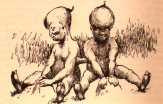
|
 COMPARE Chapter 7 |

|
|
We were approaching the famed Pillars of Hercules, and already the African one, "Ape's Hill," a grand old mountain with summit streaked with granite ledges, was in sight. The other, the great Rock of Gibraltar, was yet to come. The ancients considered the Pillars of Hercules the head of navigation and the end of the world. The information the ancients didn't have, was very voluminous. Think of the Children of Israel poking around in the desert forty years instead of cutting across; think of Peter trying to walk on the water when he had never practiced; think of Joseph getting his brothers into his power after they had treated him so shabbily and then not hanging them a little. The ancients didn't know much. Even the prophets wrote book after book and epistle after epistle, yet never once hinted at the existence of a great continent on our side of the water, yet they must have known it was there, I should think. They knew beforehand what was going to happen, and surely they ought to have known what already existed. But no, they left the ancient public to believe that the Pillars of Hercules was the head of navigation, and Columbus was the first practical prophet to come out and tell them any better. [Daily Alta California, 27 August 1867] |

|
 COMPARE Chapter 7 |

|